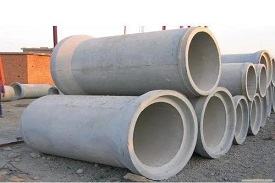
Asbestos-cement pipes and fittings for sewerage and drainage systems are widely used in civil engineering projects due to their durability, corrosion resistance, and affordability. Composed of a mixture of asbestos fibers and cement, these pipes offer excellent strength and resistance to chemical degradation, making them suitable for conveying sewage, stormwater, and industrial effluents. Asbestos-cement pipes are lightweight, easy to install, and have a smooth interior surface that minimizes friction and allows for efficient flow of liquids. Additionally, asbestos-cement fittings such as bends, tees, and couplings ensure leak-proof connections and facilitate the alignment of pipeline networks. Despite their advantages, the use of asbestos in these pipes and fittings has raised concerns regarding potential health risks associated with asbestos exposure, leading to regulations and restrictions on their use and disposal in many countries.
IS 6908:1991 holds immense importance in regulating the quality and reliability of asbestos-cement pipes and fittings specifically designed for sewerage and drainage systems. This standard serves as a critical guideline for manufacturers, establishing stringent requirements for raw materials, manufacturing processes, dimensions, and mechanical properties. By adhering to IS 6908:1991, manufacturers can ensure the production of pipes and fittings that meet essential quality benchmarks, guaranteeing their ability to withstand the demanding conditions of sewerage and drainage systems. Compliance with this standard not only ensures the structural integrity of pipelines but also safeguards public health by regulating asbestos content and ensuring the absence of defects that could compromise the effectiveness of the sewerage system or pose risks to the environment. IS 6908:1991 promotes consistency and uniformity in the production of asbestos-cement pipes and fittings, facilitating their seamless integration into sewerage and drainage networks while minimizing the risk of leaks or failures.
Note: Obtaining the ISI/BIS Certification is a mandatory requirement for manufacturers of Asbestos – Cement Pipes and Fittings for Sewerage and Drainage to sell their products in the Indian market.
Manufacturers must obtain ISI/BIS certification for their Asbestos-Cement Pipes and Fittings designed for sewerage and drainage systems to legally sell these products in India. This certification, mandated by Indian regulations, ensures compliance with specific quality and safety standards set by the BIS for the production and distribution of asbestos-cement pipes and fittings intended for sewerage and drainage applications. Without this certification, manufacturers face legal consequences and barriers in accessing the Indian market. Therefore, obtaining ISI/BIS certification is not only a regulatory requirement but also a critical step for manufacturers to demonstrate the reliability, durability, and safety of their asbestos-cement pipes and fittings for sewerage and drainage purposes. This certification process underscores the importance of ensuring the integrity and suitability of construction materials, instilling confidence among stakeholders in the infrastructure and construction sectors regarding its compliance with Indian standards for usage and distribution.
Indian Standards Institute, or ISI was renamed the Bureau of Indian Standards (BIS) in 1987. The official mark that the Bureau of Indian Standards provides for manufacturers of various goods is the ISI Mark. It is used to indicate compliance with Indian standards (IS) set by the Bureau of Indian Standards (BIS) and has been used as a conformity marking for industrial products. Manufacturers received permission from BIS to use the ISI Mark on items that comply with relevant Indian requirements through the product certification program.
Only manufacturers (domestic or foreign) who produce the finished product will be awarded ISI Certification. This will not be given to any product importers, traders, dealers, or distributors.
The following documentation is required to get an ISI certification:
For more detailed information, please click here.
There are two approaches for Indian manufacturers to become certified with the ISI Mark:
Regular Procedure
With the possible exception of cases deemed "All India first," which might take up to 180 days, the licensing procedure is expected to be finished in 120 days. This timeline starts on the day the application is received, assuming that at different points in time the documentation, unit assessment, and product conformance are all deemed acceptable.
Step 1: Manufacturing Unit Customization in Compliance with Applicable Indian Standards
Step 2: Submission of the Application Form
For more detailed information, please click here.
Simplified Procedure
This is a much faster process than the standard procedure. After a factory inspection is deemed satisfactory and the initial evaluation establishes that the sample complies with the applicable Indian Standard(s), the license application process is expected to be finished in 30 days.
Step 1: Adapting the Manufacturing Unit to Comply with the Relevant Indian Standard
Step 2: Sample Testing
For more detailed information, please click here
The process of obtaining ISI Mark Certification for Foreign Manufacturers typically includes the following steps:
Step 1: Application
Step 2: Query Raised (If Any)
For more detailed information, please click here.
Brand Liaison provides helpful support for achieving ISI Mark Certification. Among our offerings are:
Please click here to get in contact with our team of specialists for a deeper explanation of the paperwork and steps needed to get ISI Mark Certification.